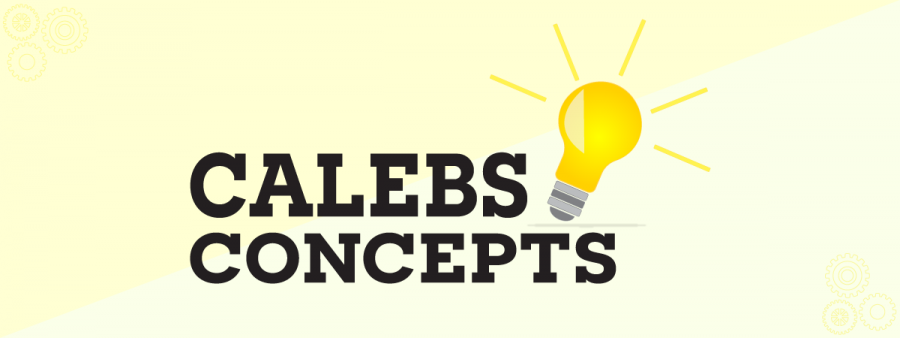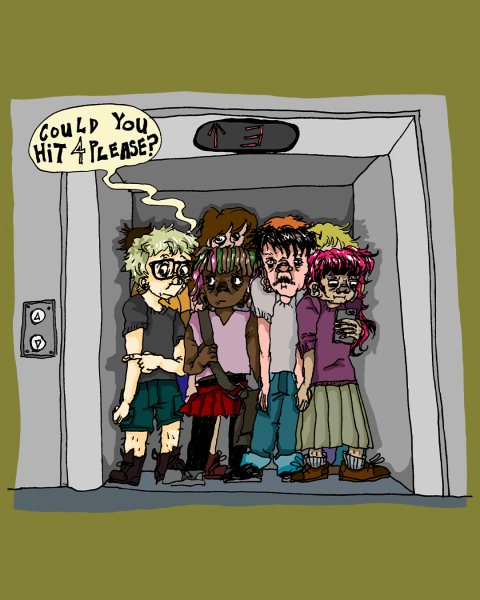Caleb’s Concepts: Why evil doesn’t exist
March 12, 2021
What if I told you the issue that has plagued humanity since its inception doesn’t exist? No, I am not discussing disease, war, or famine, since these all exist historically and persist to the present. I’m talking about evil as an abstract concept. It doesn’t exist. Here’s why.
In his 2012 book, “Righteous Mind” moral psychologist Jonathan Haidt argues humans are wired for religion because there are many documented benefits to a religious society. Religion has been shown to reduce stress and foster group cohesion which prompted neuroendocrinologist and primatologist Robert Sapolsky, an atheist, to conclude religion positively affects people’s wellbeing. As of now, this behavior appears to be uniquely human since our simian friends, chimpanzees, are spiritual, not religious.
Additionally, all known human societies have an element of religion to them, making religions a uniquely human concept. Thus, as a universally adapted cultural practice, religion must function within society, granting it an adaptive benefit. This function allowed early humans to explain the unexplainable. It would give peace of mind within a destructive universe since life expectancy was short and child mortality was high for most of history. Naturally, a supernatural explanation became appealing and defined the wrongness of the world called evil.
Yet, we now know that evil in its religious sense probably doesn’t exist. For example, take serial killers like Ted Bundy, a clear case example of a wholly evil person, right? Not exactly. Mr. Bundy suffered from a neurological condition known as psychopathy, meaning that he had a malfunctioning brain. Psychopaths have lower connections in the ventromedial prefrontal cortex and amygdala, causing lower empathy, reduced fear and heightened aggression. Depicted below is a brain scan of a normal brain versus a psychopathic one.

While there is no excuse for Ted Bundy’s behavior, it would be wrong to label his actions as evil. Instead, his murder and rapes are a product of a maladaptive brain. Therefore, in the sense of human action, evil is not a substance. Rather, it is the absence of a properly functioning system.
This concept isn’t exclusively restricted to science. One of the arguments against the existence of a benevolent all-knowing, all-powerful and all-present God is the problem of evil. If evil exists, does that mean that God created it? If so, why would an all-good God do that? If evil is independent of God, then God couldn’t have mastery of it, meaning that God is not all-powerful. To answer this difficult question, North African philosopher Saint Augustine wrote in his book, “The City of God,” that evil is the absence of good. Since we understand what good is, the absence of its presence leaves a hole in our hearts. Thus, evil is merely a product of where the good we are endowed with should be.
Many people cling to antiquated notions of evil. We believe it as a force diametrically opposed to good, and any aspect of our life that isn’t perfectly chalked up is considered evil. Rather, our concept of evil is merely the absence of what we would like or the absence of a properly functioning universe.














Emile R Olivier • Aug 13, 2021 at 6:16 am
It would be easy to blame the existence of evil on God. But the God we know has no power for good or evil because it only exists as a concept. It is an idea conceived in the brain of man and nothing can manifest in such a brain except in pair with its opposite: If good exists then its opposite, evil , must also exist. What we experience as either good or evil is/are merely illusions of perception. We live in a phenomenological world, a world of appearances. Things happen to us and around us and we perceive of them what we can and integrate those perceptions into our consciousness as best we can. Part of this process requires that we put labels on the perceptions and because we are human, labels always have an emotional aspect. They are either pleasant or unpleasant. The pleasant experiences we call good…the bad experiences we call evil.
Para logical reasoning, however, can point us toward the absolute Truth, which is that a supreme being, whether consisting of spirit or of law, does exist, just not in the form we imagine. In reality it is existence itself. This “God” is the only good…it is so by definition, having as its characteristics such attributes as omnipotence, omniscience and omnipresence. Mystics of all times have attested to this, each naming it differently but defining and describing it in nearly identical terms.
For me though, I think Jesus gave as simple and as comprehensive an answer as is possible to give. When the man approached Him with a question he addressed Jesus by saying “Good master” to which Jesus replied …” Why callest thou me good? there is none good but one, that is, God” (Matthew 19:17) So, for me, there it is…there is only one good and that is God and everything comes from and/or has been created by God… and God never created evil. Evil does not exist.
Joel Goldsmith, a spiritual teacher of the 40’s thru the 60’s explains all this very well. He authored about 35 books, the first being The Infinite Way. Most of these books are still in print…any one of them is worth a read.
Michael Edgerton • Mar 19, 2021 at 1:40 pm
Howdy,
I’d invite you to spend a little time reflecting on William Blake’s conceptions of good and evil via his “The Marriage of Heaven and Hell.” Blake’s thought is one that, despite the title, carries more philosophical nuance than religious and is considered a critical document in modern thought in organizations such as the Satanic Temple, as well as some of the most eloquent and well versed artists of modern history.
While the supposition that all concepts of evil are chalked down to an absence of “good” is an understandable line of thought, it ignores the fact that these concepts (in a philosophical sense) aren’t just some false, opposing dichotomy. They’re a mutualistic relationship. Rather than falling on such moral/rhetorical cop outs such as relativism or subjectivity, Blake’s line of thought invites you to view the idea of right and wrong as being married, to concepts that when divorced invariably become harmful to a society.
You can easily find Blake’s work online for free. If for no other reason, you’ll at least get to read some good poetry.
Hazel Crouch • Mar 13, 2021 at 7:29 am
I’ve pondered this question many times…and though my thoughts have evolved, logic pulls me away from black and white theories…
Yours is “ evil is simply the absence of goodness”…you would need a solid definition of goodness and good. The fallacy in that is that people who are literally fighting each other, killing all in their path because their side is right and good. So depending on which group you are in, vastly changes your view of goodness.
So, for humans good is subjective. That is why religions can easily create a view of goodness for the masses that they will accept.
So back to evil, I don’t believe that evil is so subjective… there are far more people who believe they are good than those willing to believe they are bad…that is hard psychology there.
I’ve always believed that evil was an act planned to cause pain and suffering to others, with the full knowledge that the actor has a choice.
Brainwashing and mind control is an amazing thing…convincing others to do harm to others is the top of the pyramid of evil…
The preponderance of media intent on harm and misinformation to the masses is at an all time high, yet no one holds them accountable…it’s not the people who are evil…it’s the corporate power to play humans against each other.